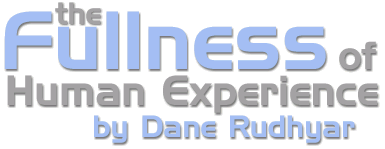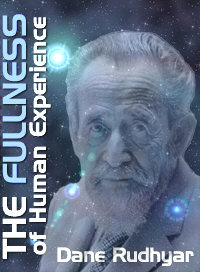 |
| Home | Bio | Art | Music | Literature | Civilization & Culture | Philosophy of Wholeness | Theosophy & Spirituality | Astrology |

CHAPTER FIVE
The Three Factors in Experience and Their Cyclic Transformation - 5 Mind; intermediary, interpreter and technician In any situation a desire is aroused. It may be an unconscious or a conscious desire; it may be the taken-for-granted motive that once led to the formation of a habit — a subjective manner of reacting to an often repeated situation. But however it manifests, and whatever the name given to it, the desire factor is operating, expressing a subjective state of being, a preference for a particular type of response. The desire-motive requires the release of some kind of energy in order to be actualized; yet many psychologists and philosophers do not seem to realize that the subjective factor never deals directly with energy. A third factor, mind, is needed as an intermediary. Mind has to operate not only as a linking activity but as an interpreter and (in the broadest sense of the word) a technician. In a famous illustration, the dualistic Sankhya School of philosophy in old India spoke of purusha (spirit) as being lame, and prakriti (the substratum of matter-energy) as being blind. Purusha is being carried over Prakriti's shoulder, showing the way to the blind. This is, however, an incomplete and misleading image; for while Prakriti may be blind, it is shown in the story to be organized as a body able and trained to walk, while the seeing Purusha can somehow choose (or is led to choose) one of several possible options in directing the steps (the operational activity) of Prakriti. A third activity is implied in the activities of the pair. This factor — mind operating at the biological level as a generic formative principle — has given an organically effective structure to the vital energies of the integrated collectivity of cells of the body; this body can at least walk. This same factor, operating at the level of culture and personhood, enables the desire to reach a goal (or at least to follow a definable direction) and to translate itself into a directive or order which can be transmitted to and sufficiently understood by the blind body of Prakriti. Because the operations of mind are manifold and assume varied aspects, the whole range of the mind's activity is not recognized for what it is. Yet these activities should never be absolutely ignored or denied, just as a subjective and a potency factor can never be entirely absent from any situation. They may at most be rendered temporarily ineffectual or intentionally paralyzed in some special and abnormal experiences. The inactivity of any one of the three factors may indeed be valuable in some special human situations, but such an inactivity can only be a means to force an issue which has produced intense stress and tensions. In the best possible cases it may produce a state of extremely focused "at-tention" to the possibility of solving a problem posed by human free will; and free will is the strictly human ability of the subjective factor to detach itself from a situation and operate as an external and assumedly unconditioned subject. In one identifiable mode of activity or another, mind operates in all situations, thus in all phases of the great cycle of being. It is the operational aspect of the principle of Relatedness which is implied in the concept and also the experience of Wholeness. It is a universal, ever-present activity. It provides channels through which the factors of desire and potency — one might also say consciousness and power — may interpenetrate and interact. These channels, however, can become too rigid and control a process they are meant to assist and indeed make effective. Starting as a servant, mind can become a tyrant, blocking the expression of new subjective desires and keeping the will in a straight-jacket. Mind indeed can so condition the acts of will that this will becomes moulded by mental prejudices and idiosyncrasies, especially by those which a collective culture and family tradition have forced upon a child since birth. Yet as we shall see, the restrictions and restraints imposed by a culture have perhaps irreplaceable value in allowing personhood to emerge with a steady rhythm from the state of life. By limiting the possibility of options available to a child and adolescent, a cultural and religious tradition acts as a structuring factor providing a relatively calm and safe psychic, familial, and socio-political environment. When ideological or personal storms unfold their potential of violent mental transformation in the child's close environment, the development of an ego tends to assume a stressful and catabolic character, and personhood takes neurotic forms. The main purpose of modern psychology, and especially psychotherapy, is to deal effectively with these forms. Philosophers compelled to become psychologists and analytical scientists by the spirit of the times (zeitgeist) try to reduce to mental processes the neurotic, experience-disorganizing tensions of the many persons seeking happiness and sociocultural fulfillment. Depth-psychologists dig into the subconscious of their clients in order to uncover the memories of unassimilated and rejected situations which impaired or distorted the flow of subjective desires and the capacity to mobilize will. Most psychologists and psychiatrists attempt to renormalize the individual person and make him or her able to function more peacefully and productively in their society. But if they are successful, the result is likely to be the stabilization of personhood at the collective level at which the culture and its processes operate. It may be a stabilizing process, a strategic withdrawal needed to regain strength and re-establish an effective contact with the potency factor — what is realistically possible for the perhaps prematurely individualizing person in an unfavorable sociocultural situation. It may also be the unconsciously accepted loss of opportunity to raise the subjectivity factor to a new level and thereby to effectuate a transmutation of desire. In all instances, mind is involved. Its activity is required as an intermediary between the subjective and potency factors. Mind has to interpret to the subject, eager to experience the fulfillment of desires, the ways of power — thus the effective modes of release of kinetic energy from a state of potential, non-operative being. Mind imagines solutions, invents instrumentalities and specific methods. Mind is the technician, concerned only with what can be reliably proven "to work" at the practical level of the control of natural energies. But mind also operates at another level in terms of the sequential emergence of phase after phase of the Movement of Wholeness. In fulfilling such a cosmogenetic function, mind is an impersonal or superpersonal evolutionary factor; while as it operates in the field of development of personhood, in most cases mind acts as a cogitative, discursive, argumentative and also conflict-producing factor responding to the pressure of conflicting desires as well as to the possibilities of using power for the satisfaction of these desires. Because the cosmic scope of the universally operative first aspect of mind is only understood in a limited sense, and because so much confusion seems to exist in assessing the value and purpose of the function of mind in the development of personhood, the next chapter will be devoted to a study, brief as it must be of these various levels of mental activity during the entire cycle of being. By permission of Leyla Rudhyar Hill Copyright © 1986 by Leyla Rudhyar Hill All Rights Reserved.  Web design and all data, text and graphics appearing on this site are protected by US and International Copyright and are not to be reproduced, distributed, circulated, offered for sale, or given away, in any form, by any means, electronic or conventional. See Notices for full copyright statement and conditions of use. Web design copyright © 2000-2004 by Michael R. Meyer. All Rights Reserved. |
 |
